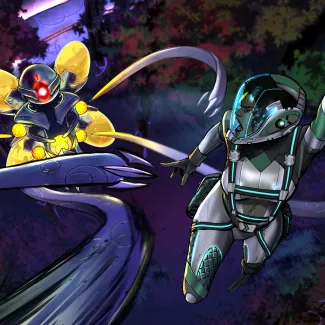Chronicler Careers: Putting Employees First
Last week we had a stress test of our Chronicler experiment. Not only were we right up on deadlines with important promises to keep with partners, but personal life events meant key team members needed to take time off.
We’re a small studio. There’s four full time devs and two fractional experts (read: part-time, but at the C-suite level) driving our business and marketing decisions. We budget for delays, from life events, to unknowns in feature development, to failures elsewhere in the pipeline. But that doesn’t prevent events in our team’s personal lives and in the world around us from affecting each one of us deeply.
We’ve made the tough call to rearrange deadlines, introduce delays, and burn some of our reserve timeline before, but not with so much on the line. In fact, every single person at Chronicler has gone through one personal struggle or another this past year that required team adjustments. Regardless, we made the call to put people over profits.
For many reasons, now feels like the right time to start talking about how that in particular is going, and not just because we’re currently in discussions with publishers. We’ve built our studio from the ground up to value smart, long-term investments that balance well with the need for sustainable growth and risk management.
This blog post will be the first in a series where I discuss our approach to building a game studio, an approach that has been driven and developed by the collective team at Chronicler.
_____
From the Beginning
Get shareable pre-alpha invites in our monthly blurbs
Invite your closest family and friends on sprawling co-op adventures you can come back to anytime.
Chronicler was founded, like many startups, as an experiment to test a hypothesis. In our case, a number of hypotheses, that had been formed by the founders over long careers in startups and the games industry.
- That there was a growing market for games that parents and teens could play together. We found that both are underserved by existing products and the market is possible to disrupt with new technology.
- That the market would continue to grow driven by the Fortnite generation having kids of their own. Eventually becoming large enough to sustain next generation game studios.
- That a lack of accountability at the leadership level has led to gross waste, employee churn, and the disastrous loss of jobs in the games industry.
- That an incredible pool of untapped senior talent exists inside and outside the games industry behind resumes without shipped games.
- That introverts and individual contributors can shine in a semi-flat structure with the right support.
* Emdash lovingly hand-written by a writing nerd, no AI involved.
Our first step was to establish a baseline: only the best of studio cultures could attract both leadership that held itself accountable and hidden senior talent. We set out to create a handbook and an accountability structure that allowed us to build the culture I mentioned at the start of this post. I think we ended up with something pretty strong.
Take a look for yourself: We Are Chronicler
Our next step was to see if we could design a game that appealed to Gen Alpha without pushing parents away. I enlisted the help of the incredibly talented Kelsey Butler, a musician who performs in NYC as Jensine On Drums, and Derek Neal, a Seattle-area mechanical engineer with a talent for designing fun puzzles.
We then tested gameplay loops. I’ve previously worked on titles like Minecraft, Halo, and Sea of Thieves, and gotten first-hand looks inside similar titles like Grounded. I knew from that experience (and empirical evidence) that parents and kids play games pretty differently.
We also tested a number of different aesthetics and designs, and the one that resonated the most in blind focus tests was an original IP with characters based on Kelsey’s and Derek’s personal stories. This gave us a focus and direction: original IP, with authentic stories told from the heart, is what Gen-A wanted our team to deliver. We just had to make sure that the parents didn’t feel left out along the way.
Once we had a clear company structure, direction, and IP development path, it was time to get building. Next was bringing along a technology I had developed on nights and weekends that just might unlock the key to games that work for Gen-A and their parents…
More GPT-free writing to come next week!
Subscribe to our newsletter or join our Discord if you’d like to follow along on the journey.






